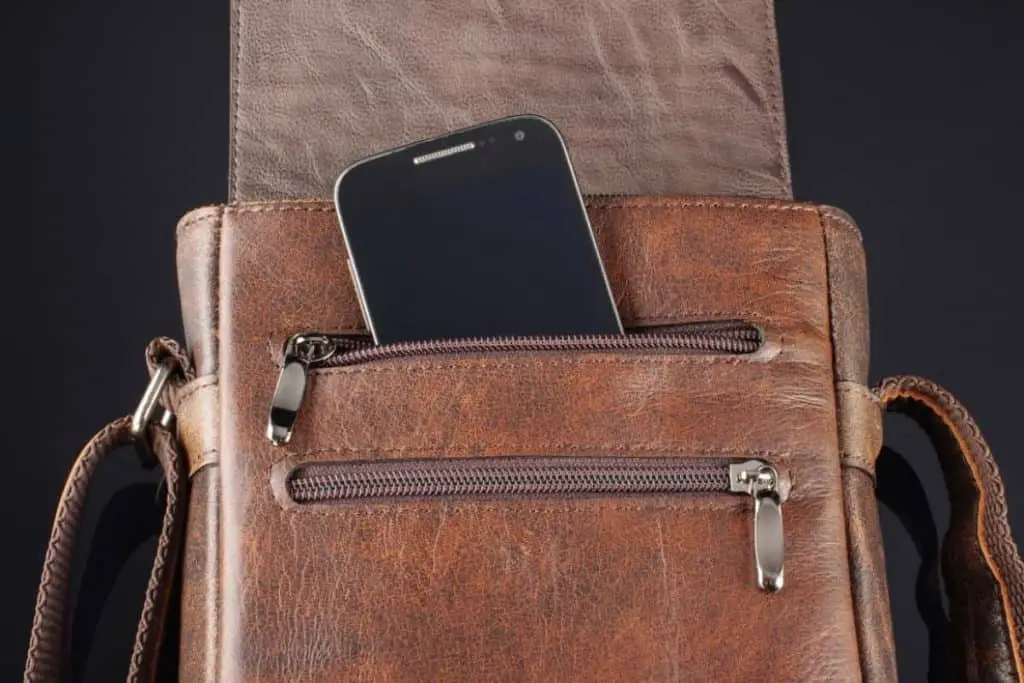Messenger bags can carry a laptop, a book, a binder, and just about anything else you might need during the day. But are messenger bags bad for your back?
Messenger bags are bad for your back if you carry them on the same shoulder daily. They’ll stretch and injure your back and neck muscles. However, unloading the bag and switching shoulders can lessen the adverse effects. Stop wearing messenger bags if you suffer from chronic back pain.
Below, I discuss the science behind the concerns and what you can do to save your back. I also discuss the warning signs of severe damage and when you need to leave the messenger bag behind. Keep reading.

Messenger Bags Can Injure Your Back
Any bag with a strap that slides handily over one shoulder is not without consequences.
Chiropractor Dr. Caleb Spreiter told Healthline that a heavy bag slung over the shoulder will pull the upper arm forward and downward, straining the muscles in the upper back and neck. Carry this bag the same way repeatedly, and you could end up with weak back and neck muscles and the pain that comes with it.
The heavier the bag is, the worse the damage becomes. Even if you sling the strap across your body diagonally, the weight of the load rests on one shoulder and pulls your body askant.
Doctors estimate that you should only attempt to carry 10% or less of your body weight on one shoulder. Any more than that, and you seriously increase the chance of injuries to your muscles or nerves.
Using Messenger Bags Wrongly Can Cause or Worsen Back Pain
The natural dangers of messenger bags are often accentuated by user error. Wearing the bag too often, loading the bag with too much, walking with bad posture, and neglecting shoulder workouts all have a part to play in the drama. The worst part is that most people have no idea of a one-strapped bag’s health risks until they already feel its effects.

These facts may seem like grim news to friends of the messenger bag, but don’t despair. There are ways to help out your body and lessen the adverse effects of a messenger bag.
How To Avoid Straining Your Muscles
Muscle strain always happens, but that doesn’t mean it should. Here are a few tips on saving your shoulders and back when carrying your messenger bag.
Don’t Overload Your Bag
An overloaded bag can seriously distress your back. In any case, you shouldn’t fit your entire workspace into your messenger bag.
Consider bringing only your laptop or tablet, a binder, a pen, and maybe a snack. You’re not going camping, so travel light. Clean out your bag of unnecessary junk at least once a week – you don’t want to carry the weight of twenty fliers you don’t care about.
All these small changes will benefit your back, not just in the unknown future. A light bag feels better to carry in the here and now, too.
Switch Shoulders
Your body isn’t meant to be lopsided. For the same reason, you don’t lift weights with only one arm; you should give your dominant carrying arm a break every half hour at most. Get into the habit of switching your bag from shoulder to shoulder to lessen the imbalance of the strain.
Muscle memory can be hard to rewrite. You may go an entire day without switching shoulders and not even realize it until you get home at night. That’s alright, so long as you try to wear your bag on the other shoulder the next day. As long as you go back and forth in some capacity, your back will be evenly balanced.
Get a Padded Strap
The wider the strap on your messenger bag, the better off you are. Thin straps can cut into your neck and back nerves and put more strain on your arm. A wider strap will distribute the weight better and free your shoulder from red marks.
Getting padding for your straps will also make the bag more comfortable. Many bags are sold with some sort of moveable padding, anyway, but if yours doesn’t have one, be sure to invest in it. Check out the KEQKEV Detachable Shoulder Strap (available on Amazon.com). Not only is it extra-light, but it also has thick padding that protects your shoulder and makes it feel comfortable at the same time.
Walk With Good Posture
We probably all have the same childhood memories of parents or grandparents telling us to “stand up straight and stop slouching!” Regardless of whether or not we followed the advice then, the principle is actually a good one. Feel free to tip your hats in silent acknowledgment of your first harshest critics now that you understand their point.
Standing and walking upright (as opposed to walking with our shoulders hunched) is healthier for the body as a whole and the neck and back muscles in particular. When wearing your messenger bag, straighten your back as you walk so you can avoid putting even more strain on your shoulders.
Use Handles if Provided

Some messenger bags are equipped with handles as well as a shoulder strap. If your hands are free and you want to take the strain off your shoulders momentarily, consider carrying the bag by these handles for a while.
Arms are much better equipped to handle the weight of a bag, and you may just save yourself a tight back in the future.
Stretch Daily
Chiropractors recommend stretching out the shoulders and back if toting a one-strapped bag often. These stretches work best if you feel for yourself which muscles in your back and shoulders are tight or sore. Once you’ve identified them, gently stretch them out and maybe roll a therapy ball over the worst area.
Stretches can also be supplemented by weightlifting for the shoulders and back. The stronger your neck and back muscles are, the less they’ll be hurt by the strain of the strap pulling against them. If you’ve been skipping shoulder or back strength exercises, now’s the time to up your game!
When To Stop Carrying a Messenger Bag
Even though you can fight the harmful effects of a one-strap bag, you ought to know when to stop carrying the bag. Below are a few warning signs you should watch for if your messenger bag is a daily part of your wardrobe.
You’re Suffering From Chronic Neck or Back Pain
Carrying a heavy weight on your shoulder day after day can lead to or complicate a condition called thoracic outlet syndrome. This ailment happens when the blood vessels between your collar bone and your first rib (the thoracic outlet) become squished. Without enough space, the blood vessels cannot properly transfer blood between your head, back, and arm.
Thoracic outlet syndrome is uncomfortable, to say the least, and can make your fingers tingle or go numb for short periods, especially after carrying a heavy bag. If you notice these symptoms, consider speaking to your doctor and laying off the messenger bag.
Back Pain Runs in Your Family
If back pain runs in your family, it might be time to ditch your messenger bag. Constant strain on one side of your body will worsen existing conditions and is not a good idea. If you don’t have back problems now but know they’re likely to develop due to your family history, stop wearing a messenger bag.

Some Safer Alternatives
If you’ve decided that you need to ditch your messenger bag, you’re not alone. Thankfully, alternatives to a messenger bag for everyday use are available on the market for you to consider.
Wear a Backpack
As it turns out, there’s a reason every school child wears a backpack to carry heavy books. While an overloaded backpack can still cause damage, it equally distributes the weight across both shoulders. Today, you can find plenty of sleek-looking backpacks that can fit everything you need for the day without endangering your spine.
Carry a Briefcase
Briefcases are the classical business-man choice for carrying things to and from work. While a briefcase will take up a hand that you may need to hold your phone or coffee, it will also allow you to listen to your body better. A sore arm is often more noticeable than a sore neck and easier to deal with quickly.
But even with a briefcase, you mustn’t overfill it with unnecessary stuff. Travel light whenever possible. Carrying a heavy briefcase is never good for your body, either.
Final Words – Are Messenger Bags Bad for Your Back?
Messenger bags are worth fighting for in many cases. They’re easy to carry, stylish, and big enough to hold whatever you need. As long as you use your messenger bag appropriately and take note of health precautions, you can use it for many years to come.
However, consider switching to other alternatives if your messenger bag is causing you pain or if you know that back pain runs in the family. A backpack or a briefcase (possibly even a rolling briefcase) might be better for you.
All product names, logos, brands, and trademarks are the property of their respective owners
